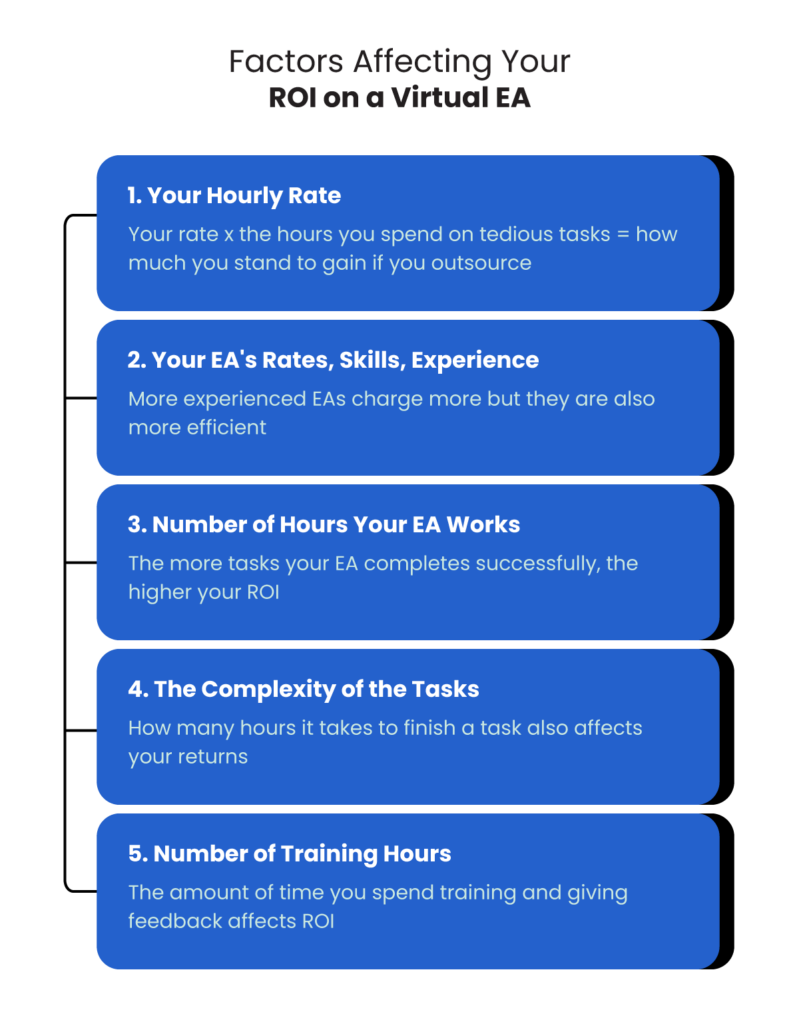No one said owning your own business was easy. It can be downright difficult at times to juggle all the responsibilities and tasks that come with it. That’s why for more and more business owners, hiring a virtual executive assistant is the answer to lightening their load and gaining back hours in their workday. But is hiring a virtual EA worth the investment, or is having an assistant a frivolous add-on?
What is a Virtual Executive Assistant?
Virtual executive assistants are professionals who provide remote business support. Their tasks may be administrative, technical, or creative. Virtual EAs also serve as the liaison for the executive or management team they serve. They are the first point of contact that external parties connect with, whether these are colleagues from other departments, subordinates, or people from outside the organization.
In other words, a virtual EA is an all-around problem solver and jack-of-all-trades. And since they work remotely, business owners can hire virtual EAs from anywhere in the world. This opens up a whole pool of talent that you wouldn’t have access to if you were only hiring locally.
For instance, at Wing, our executive assistants are college-educated, speak English, and come from around the world. Their diverse skill sets and experiences make them the perfect complement to any team that they join.
What Does a Virtual Executive Assistant Do?
A virtual EA can be a game-changer for the executive who hires them. According to this article by the Harvard Business Review, on average, a CEO works 9.7 hours a day on weekdays, and 3.9 hours a day on weekends. They usually handle a range of general tasks for their clients. Below are some typical duties of an executive assistant.
A Virtual Executive Assistant Provides Executive Support
The most common responsibility of a virtual executive assistant is business support. Daily tasks of virtual EAs include data entry, bookkeeping, expense management, call routing and reception, and inbox management.
Depending on the executive’s needs, they may also require their EA to perform specialized tasks such as content writing, Amazon listing management, real estate transaction coordination, and the like.
Executives also typically rely on their EAs for event management, hiring vendors, making reservations, and organizing their trips. Some executives may also need their EAs to do more creative tasks, such as writing and editing proposals or creating presentations.
They Also Provide Personal Support
In addition to business support, many executives also need help with personal errands and tasks. After all, they are human beings too. A virtual EA can take care of tasks like scheduling appointments, booking travel, sending gifts, and managing the household.
This allows the executive to focus on work and not have to worry about the little things in life. The main goal, at all times, is to free up the executive’s schedule and enable them to focus on what’s mission-critical.
A Virtual EA May Give Board Support
EAs may also provide support to entire boards of directors. They may act as a coordinator between the CEO and the board, or as an administrator of the company’s upper management.
EAs are used to managing complex calendars containing the work schedules of several executives. Think of an EA as upper management’s air traffic controller—they assist in getting people where they should be while preventing scheduling conflicts.
An executive assistant could assist board members in setting up meetings or live events held over the internet. They will take note of the manager’s tech requirements, set up and send meeting links, moderate webinars, and handle whatever administrative tasks may come up during the event.
They Also Provide People Operations Support
Besides coordinating for upper and middle managers, virtual EAs may also support a company’s HR team. They may handle tedious recruiting tasks like sifting through CVs, drafting and sending emails to applicants, setting up surveys, scheduling interviews and orientations, and more.
A virtual executive assistant may also help the company to hold events like online social hours or virtual parties. And because they’re used to handling last-minute changes, they can make sure that these events go off without a hitch—even if the original plan gets thrown out the window.
A Virtual Executive Assistant Can Give Marketing Support
In some cases, an EA may also provide marketing support to their executive client. They may help with market research, creating and sending email newsletters, managing social media accounts, and even running ad campaigns.
Virtual EAs usually have a strong understanding of how different marketing channels work. This allows them to take on more strategic tasks such as identifying new marketing opportunities and developing systems to track the team’s progress.
What’s the ROI on Hiring a Virtual Executive Assistant?
As you can see, an EA is a valuable member of a management team, enabling the C-suite to let go of time-consuming tasks and enabling them to pursue projects that directly affect the company’s growth. However, not all company leaders choose to hire EAs.
One of the most significant objections people have about hiring an EA is the cost. Business owners want to know if hiring an assistant will have a good ROI. Whether you’re the head of a multinational or an SMB, though, offloading tasks to an EA makes financial sense.
When you have a great working relationship with an assistant, it delivers returns on both time and financial investments. However, those rewards don’t materialize overnight. Wondering about the ROI of hiring a virtual EA? Here are several factors to consider.

Your Hourly Rate as an Executive
The first thing you need to think about is how much your time is worth. If your billable hourly rate is $400, it only makes sense to outsource tasks that cost less than that to complete. Most tasks that EAs handle fall within that broad category.
For example, if you spend two hours per week managing your email inbox, that’s 10 hours per month or 120 hours per year. At $400 per hour, that’s $48,000 in lost productivity. When you outsource email management to a virtual assistant, you not only free up your time but also save money.
Your Virtual Executive Assistant’s Rates
Think of what you’re paying your virtual assistant to do. If you intend for them to handle simple tasks like email and scheduling, their hourly rate will be lower than someone with a more diverse skill set. Conversely, if you’re paying for a full-time EA who can take on anything you throw at them, their rate will be significantly higher.
Hiring an assistant who charges more doesn’t necessarily mean a lower ROI. If the EA has plenty of experience, the efficiency and expertise they bring to the table will almost certainly make up for the increase in the cost to hire them.
Number of Hours Your EA Works
Another thing to consider is the number of work hours you would like your EA to cover. Your ROI increases if your assistant can produce good work without taking too much time. Consider as well that the average work week is 40 hours, but some EAs only work part-time.
Others may be available for extended periods to cover night shifts or take on extra assignments during busy times. In some cases, the overtime pay you’d have to shoulder is worth the money you’ll make back when your EA works more hours. A good example is if your EA covers sales calls and demos for you.
Generally, though, it’s best to start small when you’re first hiring a virtual executive assistant. You can always increase the number of hours they work later on if you feel like you need more support, or if you’d like to get more value out of your partnership.
The Complexity of the Tasks You Outsource
Not all tasks are created equal. Some take longer to complete than others, and some require more expertise. Your return on investment also varies depending on the difficulty of the tasks you’re assigning.
For example, if you’d like your assistant to manage your email, that’s a low-cost, low-complexity task. The ROI on it is understandably low. But if you’re paying them to do market research or compile data for a presentation, that’s a different story. You’d expect the ROI for these tasks to be higher since they provide more value.
Your Virtual Executive Assistant’s Skills & Experience
In addition to the complexity of the tasks you outsource, the skills and experience of your virtual assistant also contribute to your ROI. If you’re working with an EA who’s new to the field, they may need some time to learn how to do certain things.
That learning curve will lower the returns at first. But once they’re up to speed, their performance will improve, and you will start earning back the money you invest.
On the other hand, if you’re working with a highly experienced and skilled assistant, they’ll be able to hit the ground running. That means getting your investment back earlier and easier.
Number of Hours You Spend on Training
Even if your assistant is an expert, you’ll still need to spend some time training them on how to do things your way. The more hours you spend on training, the lower your ROI will be in the short term. But it’s worth it to invest that time upfront.
Once your assistant knows what they’re doing, they’ll be able to work independently with little supervision. That frees up even more of your time, which means even bigger returns down the road.
Training also extends to the amount of feedback you must give. You’ll naturally have a higher ROI if your assistant can incorporate lessons learned from previous projects. If you’re constantly having to redo things because your assistant didn’t do them right the first time, that’s going to cost time and money.
But if they consistently produce high-quality work, you’ll be able to focus on other things and get more done in fewer hours. Over time, that leads to a higher ROI.
Get a Virtual Executive Assistant from Wing
So, if you’re feeling overwhelmed with your ever-growing to-do list and could use a hand, it might be time to consider hiring a virtual EA. And if that sounds like something you want to explore further, Wing is here to help.
Wing Assistant has an extensive pool of talented professionals who are more than capable of taking on the tasks that are bogging you down. Plus, our team will work with you every step of the way to make sure your needs are met and that you get the most out of your working relationship with your new assistant. Ready to take the plunge? Give us a call today!
Aya is Wing Assistant’s blog manager. When she’s not wrangling content briefs, editing article drafts and handling on-page SEO, she is crafting messages for Wing’s other communication materials. Aya writes about SaaS startups, marketing for startups, search engine optimization, and pop culture.







